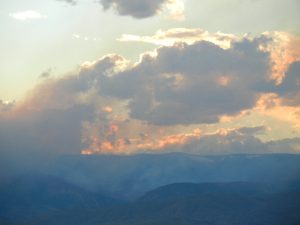While I’m on retreat, I’ll give a ‘shout out’ to one of the board members for Catholic Rural Life. Dr. Christopher Thompson, a theologian on faculty at the St. Paul Seminary in St. Paul, Minnesota, penned this piece for a recent gathering.
While millions of us take advantage of these summer months to travel with family to our national parks and forests, we can take a moment and thank God not only for the extraordinary earth he places before us, but (especially this year) for the vision and courage of our fellow Americans who took up the challenge of establishing and protecting such wilderness spaces.
 This year marks the 50th Anniversary of the Wilderness Act, which created the National Wilderness Preservation System, and now protects over 100 million acres of “Wilderness Places” from unnecessary development and exploitation. The passage of the Wilderness Act is a distinctively American achievement and marks one of our greatest accomplishments concerning the protection of our heritage and the promotion of the common good. Whether in the crisp waters of northern Minnesota or the sultry grasses of the Everglades, at the Crown of the Continent in the Montana Rockies or the soul searing heat of Death Valley, each space provides a sacred occasion, uniting all of us Americans as one nation under God’s bountiful regard.
This year marks the 50th Anniversary of the Wilderness Act, which created the National Wilderness Preservation System, and now protects over 100 million acres of “Wilderness Places” from unnecessary development and exploitation. The passage of the Wilderness Act is a distinctively American achievement and marks one of our greatest accomplishments concerning the protection of our heritage and the promotion of the common good. Whether in the crisp waters of northern Minnesota or the sultry grasses of the Everglades, at the Crown of the Continent in the Montana Rockies or the soul searing heat of Death Valley, each space provides a sacred occasion, uniting all of us Americans as one nation under God’s bountiful regard.
This common national treasure, which is our vast wilderness space, is a gift that calls out for gratitude and an obligation that unites us as one.
It is a gift from the Creator and speaks to us of God. Our Catholic faith takes no issue with those who feel close to the Lord in the splendor of His creation. Ours is a sacramental system of worship to be sure, but we are willing to see all of creation, all of God’s creatures, as a quasi-sacrament, an outward sign of God’s invitation to love in grace. Catholics especially should not be indifferent to this preambula fidei writ-large that is our wilderness, because we are not indifferent to the Word of which it speaks. The book of nature and the books of the sacred scriptures are one, for God is the serial editor of the whole series.
Wilderness also entails an obligation. No longer to be taken for granted as something which will always be there, our national commitment to the protection of wilderness spaces demands a prudent regard, a respect and restraint in light of the deeper values implicit in creation and the power it holds to expand our wonder and concern. Our faith teaches us that there is a natural law ethic to be observed. As creatures who participate in the eternal laws of God’s creation, we have an obligation, through our rational choices, to respect this order of creation and to observe a natural piety in relationship with the God from whom all these good things come.
This sense of obligation concerns not only the wilderness, but extends to our concern for ourselves and others as well. The awe you and I experience on the precipice of some vista or under a star-studded sky is the same wonder you and I are called to feel before the precious gifts of human life, our sacred bodies, our families and our beloved community. A trip through a wildlife “sanctuary” can be a catechesis in first things, a primer in the fundamental values about the goodness of God and our obligation to trust and honor Him in our lives. The impulse to praise we so often feel along a quiet trail or stream ought to strengthen our resolve to obey God and His ways.
Of course the language of the original Wilderness Act can’t speak with such theological tones, but its persistent defense of the values of the wild, hint of its origins in the American, indeed ancient, tradition of gratitude — gratitude to the one who has planted in us the magnificent gift of wonder before creation and the felt need to respond, to live a life consistent with our dignity amidst this delicate fabric of nature and under the loving care of nature’s God.
0